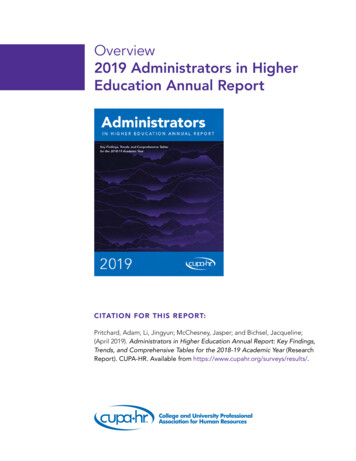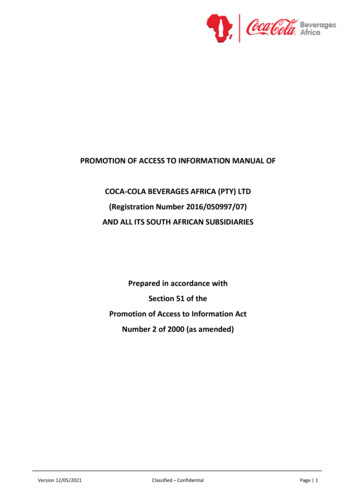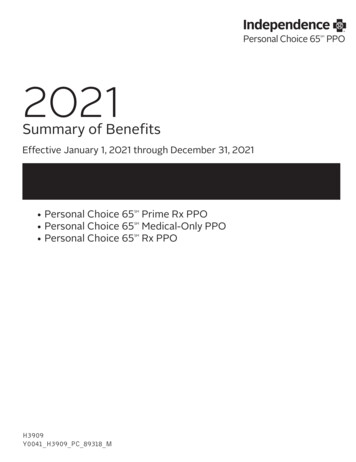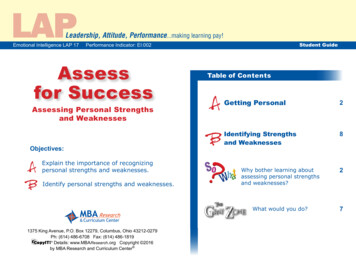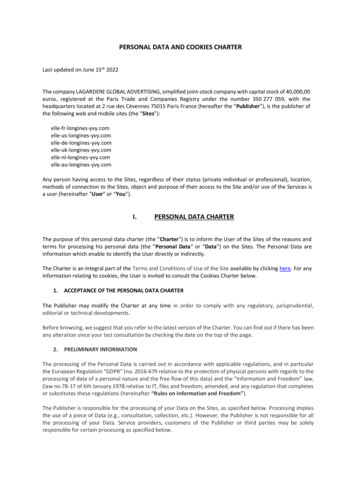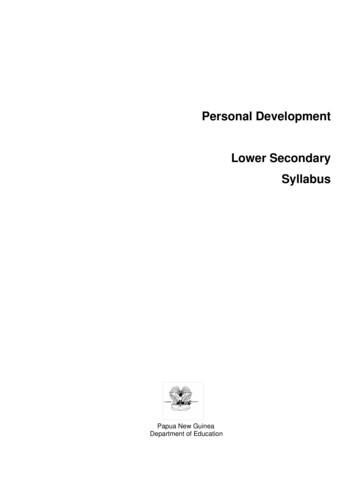
Transcription
CURRICULUM VITAEYULIYA KOSYAKOVA(October 2020)PERSONAL INFORMATIONFamily name, first name: Kosyakova, YuliyaDate of birth: 28.05.1982Country of birth: UkraineORCID ID: 0000-0002-9621-1755Webpage: https://kosyakova.orgE-Mail: yuliya.kosyakova@iab.deNationality: GermanChildren: one son (maternity leave: 02.2015–06.2015)Google Scholar: 496 citations, h-index: 12(https://scholar.google.com/citations?user oAdE2isAAAAJ&hl en)RESEARCH FOCUSLabor market and employment, migration and integration of refugees and other migrants, language acquisition,division of household labor, educational opportunities, social stratification, gender, life course, adult education,post-socialist societies particularly Russia, international comparison, institutional change, and quantitative dataanalysis.ACADEMIC POSITIONSsince 02/2020since 09/2019since 20072001–20021999–2001TEACHINGFall term 2020Spring term 2020Fall term 2019Associate Lecturer, chair in Sociology, Area Social Stratification, University of BambergAssociate Lecturer, chair in Comparative Sociology, University of MannheimSenior Researcher, Migration and International Labour Studies, Institute for EmploymentResearch. Since 01/2019, Head of Project (with H. Brücker), IAB-BAMF-SOEP Survey ofRefugeesResearch scientist, Department of Political and Social Sciences, European UniversityInstitute, ERC advanced grant project eduLIFE (Education as a Lifelong Process – ComparingEducational Trajectories in Modern Societies)Research scientist, Chair of Sociology I, University of Bamberg, ERC advanced grant projecteduLIFE (Education as a Lifelong Process – Comparing Educational Trajectories in ModernSocieties)Research assistant, Statistical Methods Centre (KEM), Institute for Employment ResearchStudent assistant, Chair of Economics - Empirical Microeconomics, Otto-Friedrich-Universityof BambergPh.D. in Political and Social Sciences, European University InstituteThesis: “The regime change and social inequality: Educational and job careers in the Sovietand post-Soviet Era”Master of Science in European Economic Studies, Otto-Friedrich-University of Bamberg,Grade 1,6 / ECTS B.Thesis: “Influences of Respondent and Interviewer Incentives on Survey Responses. AnEmpirical Analysis using PASS”Bachelor of Art in European Economic Studies, Otto-Friedrich-University of Bamberg, Grade2,16 / ECTS B.Thesis: “Road pricing in the western European Union–Theoretical background and proposalsfor reform”(stayabroad) Studies of Economics, Université de Fribourg Suisse, Grade 2,2 / ECTS B(distance) Studies of Management and Business of the socio-cultural activity , Kiev NationalUniversity of Culture and ArtStudies in Economics, International Solomon University of KievIntroduction in Sociology of Migration. University of Bamber, Bachelor DegreeResearch on migration and integration / Ethnic inequality / Advanced topics in the sociologyof migration: Integration of refugees and social stratification. University of Bamber, MasterDegreeHS Selected Topics in General and Specific Sociology: Integration of refugees and socialstratification. University of Mannheim, Bachelor/Master Degree1
AWARDS AND GRANTS2019201820142011ECSR interdisciplinary conference (together with the IAB): “Refugee Migration and IntegrationRevisited: Lessons from the Recent Past”, 3000 EUR; due to Corona Pandemic, the IAB-ECSRconference is postponed to 2020PI: Development of Tools to Detect Interviewer Falsification. The Charles Cannell Fund inSurvey Methodology, 9762.06 USDYoung Scholar Grant to attend the Conference “How education systems shape educationalinequalities?”, LuxemburgHonor for successful participation in high-school competition for the best Diploma-/MasterThesis, David-Kopf 2011 (Top ten). Master-thesis "Influences of Respondent and InterviewerIncentives on Survey Responses. An Empirical Analysis using PASS", GeilenkirchenPUBLICATIONS IN REFEREED JOURNALS1. Grasso, M., Klicperová, M., Koos, S., Kosyakova, Y., Petrillo, A., Vlase, I. (2020). The social impact of the‘coronavirus crisis’ in European Societies: What we know and where do we go from here? EuropeanSocieties, forthcoming.2. Kosyakova, Y., Brücker, H. (2020). Seeking asylum in Germany: Do human and social capital determine theoutcome of asylum procedure? European Sociological Review, 36(5): 663–683.3. Kosyakova, Y., Brenzel, H. (2020). How do length of asylum procedure and legal status affect labor marketintegration of refugees? Evidence from Germany. Soziale Welt, 71(1-2): 123–159.4. Brücker, H., Kosyakova, Y., Valisadeh, E. (2020). Has there been a “refugee crisis”? New insights on therecent refugee arrivals in Germany and their integration prospects. Soziale Welt, 71(1-2): 24–53.5. Sakshaug, J. W., Beste, J., Coban, M., Fendel, T., Haas, G.-C., Hülle, S., Kosyakova, Y., König, C., Kreuter, F.,Küfner, B., Müller, B., Osiander, C., Schwanhäuser, S., Stephan, G., Vallizadeh, E., Volkert, M., Wenzig, C.,Westermeier, C., Zabel, C., Zins, S. (2020). Impacts of the COVID-19 Pandemic on Labor Market Surveys atthe German Institute for Employment Research. Survey Research Methods, 14(2): 229–233.6. Kosyakova, Y. (2020). Gender inequality and the regime change: adult education and labor market rewardsin the Soviet and post-Soviet Russia. Zeitschrift für Erziehungswissenschaft, 7, 51-81.7. Kosyakova, Y., Gerber, T. P. (2019). Adult Education, Stratification, and Regime Change: Upgrading andSidestepping in Russia, 1965–2005. Sociology of Education, 92(2): 124-149.8. Yastrebov, G., Kosyakova, Y., Kurakin, D. (2018). Slipping Past the Test: Heterogeneous Effects of SocialBackground in the Context of Inconsistent Selection Mechanisms in Higher Education. Sociology ofEducation, 91(3): 224-241.9. Kosyakova, Y. (2018). Cumulation or compensation? Returns to adult education and social inequalities inSoviet and Post-Soviet Russia. In: European Societies, 20(1): 65-88.10. Kosyakova, Y., Saar, E., and Dämmrich, J. (2017). Institutional change and gender inequalities at labourmarket entry: A comparison of Estonia, Russia, and East and West Germany. Studies of Transition Statesand Societies, 9(2): 17-40.11. Fendel, T., Kosyakova, Y. (2017). Ökonomische und soziale Integration von Geflüchteten in Deutschland:Mögliche Lehren aus vergangenen Erfahrungen. Geographische Rundschau, 3: 30-37.12. Vono de Vilhena, D., Kosyakova, Y., Kilpi-Jakonen, E., and McMullin, P. (2016). Does adult educationcontribute to securing non-precarious employment? A cross-national comparison. Work, Employment andSociety, 30(1): 97-117.13. Kosyakova, Y., Dämmrich, J., and Blossfeld, H.-P. (2016). Participation in Formal Adult Education and itsImpact on Inequality over the Life Course in Contemporary Russia. World Studies in Education, 17(1): 5-26.14. Dämmrich, J., Kosyakova, Y., and Blossfeld, H.-P. (2015). Gender and job-related non-formal training: Acomparison of 20 countries. In: International Journal of Comparative Sociology, 56(6): 433-459.15. Triventi, M., Skopek, J., Kosyakova, Y., Buchholz, S., and Blossfeld, H.-P. (2015). Gender Inequalities at LaborMarket Entry: A Comparative View from eduLIFEProject. Comparative Social Research, 31: 25-5116. Kosyakova, Y., Kurakin, D., and Blossfeld, H.-P. (2015). Horizontal and Vertical Gender Segregation in Russia– Changes upon Labour Market Entry Before and After the Collapse of the Soviet Regime. EuropeanSociological Review, 31(5): 573-590.17. Kosyakova, Y., Skopek, J., and Eckman, S. (2015). Do Interviewers Manipulate Responses to FilterQuestions? Evidence from a Multilevel Approach. International Journal of Public Opinion Research, 27(3):417-431.18. Kilpi-Jakonen, E., Vono de Vilhena, D., Kosyakova, Y., Stenberg, A., and Blossfeld, H.-P. (2012). The Impactof Formal Adult Education on the Likelihood of Being Employed: a Comparative Overview. Studies ofTransition States and Societies, 4(1): 48–68.2
MONOGRAPHS AND EDITED VOLUMES19. Grasso, M., Klicperová, M., Koos, S., Kosyakova, Y., Petrillo, A., Vlase, I. (Eds.) (forthcoming). EuropeanSocieties in the Time of the Coronavirus Crisis. European Societies, Special Issue.20. Blossfeld, H.-P., Kosyakova, Y., Skopek, J., Kurakin, D., and Yastrebov, G. (Eds.) (2016). Образование какнепрерывный процесс в течение жизни: Сравнительные образовательные траектории в современныхобществах [Education as a lifelong process comparing educational trajectories in modern societies]. TheJournal of Sociology and Social Anthropology, 19 (5/88), Thematic issue.21. Kosyakova, Y. (2016). The regime change and social inequality. Educational and job careers in the Soviet andpost-Soviet Era. Florence: European University Institute.UNDER REVISION, WORKING PAPERS AND ONGOING RESEARCHImmigrants and Refugees22. Does facilitated access to health system improves physical and psychological health outcomes? Evidencefrom quasi-experiment? (with P. Jaschke). International Migration Review (minor revisions).23. The Effect of Social Networks on Migrants’ Labor Market Integration: A Quasi-Experiment (with K. Gërxhani),European Sociological Review (under review).24. Linguistic enclaves and language proficiency of immigrants: Self-selection or learning? (with A. Kanas and E.Vallizadeh), Demography (under review).25. Do institutional boundaries at arrival matter? Labor market integration of migrants in Germany (with H.Brücker), European Union Politics (under review).26. To work or to study? Immigrants’ educational investments after migration – evidence from a choiceexperiment among adult refugees in Germany (with A. Damelang), Research in Social Stratification andMobility (under review).27. Inter- and intra-ethnic social networks and say in the household devision of labor: Evidence from the refugeefamilies (with N. Kulic).Adult education28. Formal Adult Education and Socioeconomic Inequality: Second Chances or Matthew Effects? (with D. Bills),KZfSS Kölner Zeitschrift für Soziologie und Sozialpsychologie (under review).29. Alleviated inequalities? Alternative paths in adult learning and education in times of educational expansionin Russia (with N., Karmaeva and D. Bills).Data Quality30. Positive learning or deviant interviewing? Mechanisms of experience on interviewer behavior (with L.Olbrich, S. Schwanhäuser, and J.W. Sakshaug), Journal of Survey Statistics and Methodology (R&R).31. Olbrich, L., Kosyakova, Y., Sakshaug, J. W., Schwanhäuser, S.: Identifying deviant interviewers usingmultilevel models: Evidence from a large-scale face-to-face survey (with L. Olbrich, J.W. Sakshaug, and S.Schwanhäuser), Journal of the Royal Statistical Society. Series A (under review).32. How to catch a falsifier? Comparison of Statistical Detection Methods for Interviewer Falsification (with S.Schwanhäuser, and J.W. Sakshaug), Public Opinion Quaterly (under review).CHAPTER IN EDITED JOURNALS AND NON-REFEREED PUBLICATIONS33. Damelang, A., Kosyakova Y. (2020). To work or to study? Postmigration educational investments of adultrefugees in Germany – evidence from a choice Experiment. In: IAB-Discussion Paper, 2020 (31).34. Schwanhäuser, S., Sakshaug, J.W., Kosyakova, Y., Kreuter, F. (2020). Statistical identification of FraudulentInterviews in Surveys: Suggestions for Improving Interviewer Control. In Olson., K., Smyth, J., Dykema, J.,Holbrook, A., Kreuter, F. and West, B. (Eds.) Interviewer Effects from a Total Survey Error Perspective.Chapman & Hall/CRC Press, Taylor & Francis Group. P. (Chapter 7, 16 pages)35. Gërxhani, K., Kosyakova Y. (2020). The Effect of Social Networks on Migrants’ Labor Market Integration: ANatural Experiment. In: IAB-Discussion Paper, 2020 (3).36. Brücker, H., Jaschke, P., Kosyakova (2019) Refugee Migration to Germany Revisited: Some Lessons on theIntegration of Asylum Seekers. In: XI European Conference of the fRDB on “How to manage the refugeecrisis”, 2019.37. Kosyakova Y., Olbrich L., Sakshaug J.W., Schwanhäuser S. (2019) Identification of Interviewer Falsification inthe IAB-BAMF-SOEP Survey of Refugees in Germany. In: FDZ Methodenreport, 2019 (2).38. Jaschke, P. Kosyakova Y. (2019) Does facilitated access to the health system improve asylum-seekers’ healthoutcomes? Evidence from a quasi-experiment. In: IAB-Discussion Paper, 07/2019.39. Kosyakova, Y., Kurakin, D., and Blossfeld, H.-P. (2018). Горизонтальная и вертикальная гендернаясегрегация в России на этапе выхода на рынок труда в России до и после распада Советского Союза[Horizontal and vertical gender segregation in Russia at the labor market entery in Russia before and after3
40.41.42.43.44.45.46.47.48.49.50.51.52.the collapse of the Soviet Union]. In Karnoy, M., Froumin, D., and Karmajeva, N. (Eds.) Образование исоциальная дифференциация [Education and social stratification]. Moscow: HSE. P.310-346Kosyakova, Y. and Yastrebov, G. (2017). Early education and care in Post-Soviet Russia: Social policy andinequality patterns. In: H.-P. Blossfeld, M. Triventi, J. Skopek, and S. Buchholz (Eds.), Childcare, EarlyEducation and Social Inequality: An International Perspective (pp. 49-66). Cheltenham, UK/Northampton,MA, USA: Edward Elgar.Bills, D., Kosyakova, Y. (2016). Adult education. In: G. Ritzer (Ed.) Wiley Blackwell Encyclopedia of Sociology.Wiley-Blackwell. (published online: 1 Aug. 2016).Kosyakova, Y., Yastrebov, G., Yanbarisova, D. and Kurakin, D. (2016). The Reproduction of Social Inequalitywithin the Russian Educational System. In: H.-P. Blossfeld, M. Triventi, J. Skopek, and S. Buchholz(Eds.), Models of Secondary Education and Social Inequality: An International Comparison (pp. 323-342).Cheltenham, UK/Northampton, MA, USA: Edward Elgar.Kosyakova, Y., Yastrebov, G. (2016). Дошкольное образование и услуги по уходу за детьми впостсоветской России: социальная политика и социальное неравенство. [Early Education and Care inPost-Soviet Russia: Social Policy and Inequality Patterns]. In: The Journal of Sociology and SocialAnthropology, 19 (5/88), 39-53.Kosyakova Y., Yastrebov G., Yanbarisova D. and Kurakin D. (2016). Воспроизводство социальногонеравенства в российской образовательной системе. [The Reproduction of Social Inequality in theRussian Educational System]. In: The Journal of Sociology and Social Anthropology, 19 (5/88), 76-97.Skopek J., Triventi M., Kosyakova Y., Buchholz S. and Blossfeld H.-P. (2016). Гендер и начало трудовогопути: Результаты международного сравнительного исследования. [Gender, Education, andEmployment: Lessons Learned from the Comparative Perspective]. In: The Journal of Sociology and SocialAnthropology, 19 (5/88), 98-126.Kosyakova Y., Kurakin D. (2016). Имеют ли значение институты? Профессиональная гендернаясегрегация на этапе выхода на рынок труда в советской и постсоветской России. [Do InstitutionsMatter? Occupational Gender Segregation at Labor Market Entry in Soviet and Post-Soviet Russia]. In: TheJournal of Sociology and Social Anthropology, 19 (5/88), 127-145.Kosyakova Y., Dämmrich J. (2016). Профессиональное образование взрослых в Российской Федерации:больше образовательных возможностей без компенсации социального неравенства. [Job-RelatedAdult Learning in the Russian Federation: More Educational Opportunities without an Equalization Effect].In: The Journal of Sociology and Social Anthropology, 19 (5/88), 162-179.Kosyakova, Y. (2016). Постсоциалистическая трансформация и социальное неравенство: обзоросновных результатов диссертационного исследования. [The Regime Change and Social Inequality:Summary of Core Results of the PhD Project]. In: The Journal of Sociology and Social Anthropology, 19 (5/88),180-197.Kosyakova, Y., Kurakin, D. (2015). Do Institutions Matter? Occupational Gender Segregation at Labor MarketEntry in Soviet and Post-Soviet Russia. In: H.-P. Blossfeld, J. Skopek, M. Triventi, and S. Buchholz(Eds.), Gender, Education and Employment: An International Comparison of School-To-Work Transitions (S:304-324). Cheltenham, UK/Northampton, MA, USA: Edward Elgar.Blossfeld, H.-P., Buchholz, S., Dämmrich, J., Kilpi-Jakonen, E., Kosyakova, Y., Skopek, J., Triventi, M., andVono de Vilhena, D. (2015). Gender Differences at Labor Market Entry: The Effect of Changing EducationalPathways and Institutional Structures. In: H.-P. Blossfeld, J. Skopek, M. Triventi, and S. Buchholz(Eds.), Gender, Education and Employment: An International Comparison of School-To-Work Transitions (S:3-38). Cheltenham, UK/Northampton, MA, USA: Edward Elgar.Blossfeld, H.-P., Skopek, J., Kosyakova, Y., Triventi, M., and Buchholz, S. (2015). Gender, Education, andEmployment: Lessons Learned from the Comparative Perspective. In: H.-P. Blossfeld, J. Skopek, M.Triventi, and S. Buchholz (Eds.), Gender, Education and Employment: An International Comparison of SchoolTo-Work Transitions (S: 347-382). Cheltenham, UK/Northampton, MA, USA: Edward Elgar.Kosyakova, Y. (2014). Job-related adult learning in the Russian Federation: More educational opportunitieswithout an equalization effect. In: H.-P. Blossfeld, E. Kilpi-Jakonen, D. Vono de Vilhena, and S. Buchholz(Eds.), Adult Learning in Modern Societies: Patterns and Consequences of Participation from a Life-CoursePerspective (S: 140–161). Cheltenham, UK/Northampton, MA, USA: Edward Elgar.POLICY ADVICE AND REPORTS53. Brücker, H., Fendel, T., Guichard, L., Gundacker, L., Jaschke, P., Keita, S., Kosyakova, Y., Vallizadeh, E., (2020):Fünf Jahre “Wir schaffen das” – Eine Bilanz aus der Perspektive des Arbeitsmarktes. IAB-Forschungsbericht,11/2020, Nürnberg, 65 S.54. Kosyakova, Y. (2020). Mehr als nur ein Job: Die qualitative Dimension der Integration in Arbeit vonGeflüchteten in Deutschland. Wiso-Diskurs, 09/2020. Bonn: Friedrich-Ebert-Stiftung.4
55. Brücker, H., Kosyakova, Y., (2020): Was wissen wir über die Erwerbstätigkeit von Geflüchteten inDeutschland? Einige Antworten auf häufig gestellte Fragen. In: IAB Forum, 2 Mars 2020. Nürnberg.56. Brücker, H., Kosyakova, Y., Schuß, E. (2020): Fünf Jahre seit der Fluchtmigration 2015: Integration inArbeitsmarkt und Bildungssystem macht weitere Fortschritte. In: IAB Kurzbericht, 4/2020. Nürnberg, 16 S.57. Brücker, H., Jaschke, P., Kosyakova, Y. (2019): Integrating Refugees and Asylum Seekers into the GermanEconomy and Society: Empirical Evidence and Policy Objectives. Washington, DC: Migration Policy Institute.58. Kosyakova (2019) Fortschritte bei der Integration der Geflüchteten in Deutschland. In: Mobile Beratung zuBildung und Beruf als Modell Beruflicher Integration von Geflüchteten Menschen in Berlin. Berlin: DQG mbH,P:iB – Partnerschaften in der Bildungsberatung. S. 7-11.59. Brücker, H., Hainmueller, J., Hangartner, D., Jaschke, P., Kosyakova (2019) Refugee Migration to GermanyRevisited: Some Lessons on the Integration of Asylum Seekers. Policy Brief. In: XI European Conference ofthe fRDB on “How to manage the refugee crisis”, 2019.60. Brenzel, H.; Kosyakova, Y. (2019): Geflüchtete auf dem deutschen Arbeitsmarkt: Längere Asylverfahrenverzögern Integration und Spracherwerb. In: IAB Kurzbericht, 6/2019. Nürnberg, 16 S.61. Brücker, H.; Croisier, J.; Kosyakova, Y.; Kröger, H.; Pietrantuono, G.; Rother, N.; Schupp, J. (2019): Secondwave of the IAB-BAMF-SOEP Survey: Language skills and employment rate of refugees improving with time.In: IAB Brief Report, 3/2019. Nürnberg, 16 S.62. Brücker, H.; Croisier, J.; Kosyakova, Y.; Kröger, H.; Pietrantuono, G.; Rother, N.; Schupp, J. (2019): ZweiteWelle der IAB-BAMF-SOEP-Befragung: Geflüchtete machen Fortschritte bei Sprache und Beschäftigung. In:IAB-Kurzbericht, 3/2019. Nürnberg, 16 S.63. Kosyakova, Y., Sirries, S. (2017) Large-Scale Immigration and Labour Market Integration: First Lessons fromthe Recent Past in Germany. Intereconomics: Review of European Economic Policy, 52 (5): 263-269.64. Kosyakova, Y. (2017): „Frauen nach der Flucht“. Interview für Fachmagazin IQ Konkret, FörderprogramIntegration und Qualifizierung, gefördert durch Bundesministerium für Arbeit und Soziales undEuropäischen Sozialfond. Ausgabe 3/2017. Berlin.65. Brenzel, H., Brücker, H., Fendel, T., Hauptmann, A., Jaschke, P., Kosyakova, Y. (2017): Zur Integration vonGeflüchteten. (IAB-Stellungnahme, 06/2017), Nürnberg, 10 S.66. Brenzel, H., Kosyakova, Y. (2017): “Höchste schulische Bildungs- und berufliche Ausbildungsabschlüsse”In: Brücker, H. (Hrsg.); Rother, N. (Hrsg.); Schupp, J. (Hrsg.) IAB-BAMF-SOEP-Befragung von Geflüchteten2016: Studiendesign, Feldergebnisse sowie Analysen zu schulischer wie beruflicher Qualifikation,Sprachkenntnissen sowie kognitiven Potenzialen. IAB-Forschungsbericht. 13/2017, Nürnberg, 19-21.67. Kosyakova, Y., Brenzel, H. (2017): “Teilnahme an Maßnahmen zum Spracherwerb sowie zurBildungsbeteiligung in Deutschland” In: Brücker, H. (Hrsg.); Rother, N. (Hrsg.); Schupp, J. (Hrsg.) IAB-BAMFSOEP-Befragung von Geflüchteten 2016: Studiendesign, Feldergebnisse sowie Analysen zu schulischer wieberuflicher Qualifikation, Sprachkenntnissen sowie kognitiven Potenzialen. IAB-Forschungsbericht. 13/2017,Nürnberg, Berlin, 41-53.68. Brücker, H.; Rother, N.; Schupp, J.; Babka von Gostomski, C.; Böhm, A.; Fendel, T.; Friedrich, M.;Giesselmann, M.; Holst, E.; Kosyakova, Y.; Kroh, M.; Liebau, E.; Richter, D.; Romiti, A.; Schacht, D.; Scheible,J. A.; Schmelzer, P.; Siegert, M.; Sirries, S.; Trübswetter, P.; Vallizadeh, E. (2016): Forced migration, arrival inGermany, and first steps toward integration. In: DIW Economic Bulletin, 6 (48), 541-556.69. Brücker, H.; Rother, N.; Schupp, J.; Babka von Gostomski, C.; Böhm, A.; Fendel, T.; Friedrich, M.;Giesselmann, M.; Holst, E.; Kosyakova, Y.; Kroh, M.; Liebau, E.; Richter, D.; Romiti, A.; Schacht, D.; Scheible,J. A.; Schmelzer, P.; Siegert, M.; Sirries, S.; Trübswetter, P.; Vallizadeh, E. (2016): IAB-BAMF-SOEP-Befragungvon Geflüchteten: Flucht, Ankunft in Deutschland und erste Schritte der Integration. In: IAB-Kurzbericht,24/2016, Nürnberg, 16 S.70. Brücker, H. (Hrsg.); Rother, N. (Hrsg.); Schupp, J. (Hrsg.); Babka von Gostomski, C.; Böhm, A.; Brücker, H.;Fendel, T.; Friedrich, M.; Giesselmann, M.; Holst, E.; Kosyakova, Y.; Kroh, M.; Liebau, E.; Richter, D.; Romiti,A.; Rother, N.; Schacht, D.; Scheible, J. A.; Schmelzer, P.; Schupp, J.; Siegert, M.; Sirries, S.; Trübswetter, P.;Vallizadeh, E. (2016): IAB-BAMF-SOEP-Befragung von Geflüchteten: Überblick und erste Ergebnisse. (IABForschungsbericht, 14/2016), Nürnberg, 100 S.MEMBERSHIP IN ACADEMIC ASSOCIATIONSAS Akademie für Soziologie; CLIC – Comparative Life Course and Inequality Research Centre, European UniversityInstitute, Florence, Italy; ISA – International Sociological Association, RC04 Sociology of Education, RC28 SocialStratification, RC31 Sociology of Migration; Member of the INBIL – Institute for Longitudinal Educational Research/Institut für bildungswissenschaftliche Längsschnittforschung.EDITORIAL ACTIVITIESSince 2018European Societies, Associate Editor5
REFEREE FORJournalsActa Sociologica, European Societies, European Sociological Review, European Union Politics,Field Methods, Global Social Policy, International Journal for Comparative Sociology, Journalfor Educational Research Online, Journal for Labor Market Research, International Journal ofLiefelong Education, International Journal of Public Opinion Research, Kölner Zeitschrift fürSoziologie und Sozialpsychologie, Methodological Issues of Longitudinal Surveys, Research inSocial Stratification and Mobility, Sociology of Education, Soziale Welt, Studies of TransitionStates and SocietiesPROFESSIONAL ACTIVITIES2020 Organizer of the interdisciplinary IAB-ECSR conference “Refugee Migration and IntegrationRevisited: Lessons from the Recent Past”. The conference is postponed to 2021 due to theCorona Pandemic2011-2015 Co-organizer of the bi-annual eduLIFE Workshops, European University Institute (2012-2015),University of Bamberg (2011).SUPERVISION AND MENTORINGSince 2020 Lukas Olbrich (jointly with J. W. Sakshaug), University of Munich and Institute for EmploymentResearch. PhD expected in 20242019 Lukas Olbrich (jointly with J. W. Sakshaug), Master Thesis. University of Munich and Institutefor Employment Research. PhD expected in 20242019 Christina Reisinger (jointly with J. W. Sakshaug), University of Munich and Institute forEmployment Research. PhD expected in 2024Since 2018 Anja Wunder, University of Erlangen-Nuremberg and Institute for Employment Research.Doctoral MentoringPRESENTATIONS IN PEER-REVIEWED CONFERENCES2020 40. Kongress der Deutschen Gesellschaft für Soziologie (DGS), digital, 14.–24 of September.ZEW Workshop “Immigration, Integration and Attitudes”. Mannheim, Germany, 22-23 ofSeptember.IAB Conference “Labour Market Transitions: Challenges for Public Policies and Research”.Nuremberg, Germany, 7-9 of September.2019 ECSR 2019 “Inequality over the life course”, Lausanne, Switzerland, 12-14 September.8th Conference of the European Survey Research Association (ESRA). Zagreb, Kroatien, 15-19 ofJuly.International Conference Immigrants Integration: Educational Opportunities and Life Chances(IIEO). Monte Verità, Ascona, Schweiz, 23-28 June.Wissenschaftliche Jahrestagung LERN 2019 „Bildung im Erwachsenenalter: Herausforderungenund Potenziale für die Bildungsforschung“. Nuernberg, Germany, 25-26 March.ISA RC28 Spring Meeting 2019 “Long-term consequences of the Great Recession forstratification, mobility and inequality”. Frankfurt (Main), Germany, 21-23 April.ECSR – Thematic conference on “Migration, Inequality and Social Stratification”. Milan, Italy,14-15 March.2018 ECSR 2018 “Causes and Consequences of Inequalities in Europe”. Paris, France, 29-31 October.2nd Interdisciplinary Workshop for Junior Educational Researchers. Berlin, Germany, 8-9October.Wisconsin Russia Project Young Scholars Workshop at the University of Wisconsin-Madison.Madison, Wisconsin, USA, 26-27 July.XIX ISA World Congress of Sociology “Power. Violence, and Justice: Reflections, Response,Responsibilities”. Toronto, Canada, 15-21 July.ISA RC28 (Social Stratification and Mobility), Spring Meeting 2018 “Rethinking Social Inequalityin the Globalizing World”. Seoul, Korea, 25-27 May.2017 Ethnic inequality on the labor market. cross-national perspectives and causal analysis.Amsterdam, Netherlands, 28-29 September.ECSR 2017 "Institutions, Inequality and Social Dynamics”. Milan, Italy, 31 August-2 September.ISA RC28 Summer Meeting "Increasing mobility and reducing inequality: What guidance isprovided by sociological research?". New York City, USA, 8-10 August.14th IMISCOE Annual Conference “Migration, Diversity and Cities”. Rotterdam, Netherlands,28-30 June.6
201620152014201320122011Nordic Demographic Symposium 2017 "Demography and Social Inequalities”. Turku, Finnland,14-16 June.ISA RC28 (Social Stratification and Mobility), Spring Meeting 2017 “Social Inequality andMobility revisited. Challenges through recent Demographic Trends". Cologne, Germany, March30 - April 1.ISA Research Committee on the Sociology of Migration RC31 conference “Migration in aTurbulent World". Doha, Qatar, 26-28 November.ECSR (European Consortium for Sociological Research) conference “Stratification andPopulation Processes in European Societies". Oxford, The UK, 22-24 September.(Persistent) Inequalities Reconsidered: Education and Social Mobility. Switzerland, MonteVerita, 26-31 July.How do educational systems shape educational inequalities? Luxemburg, Luxemburg, 2-4 July.RC28 Spring 2014 Meeting. Budapest, Hungary, 8-10 May.ECSR (European Consortium for Sociological Research) conference “Developments in SocialInequality and Social Cohesion". Tilburg, Netherlands, 14-16 October.1st SPP 1646 Summer School. Bamberg, Germany, 16-17 September.RC28 Spring 2013 Meeting. Trento, Italy, 16-18 May.7th Annual International Conference on Sociology. Athens, Greece, 6-9 May.ECSR, EQUALSOC & University of Trento Joint Summer School. Trento, Italy, 3-7 September 3-7.11th Global Conference on Ageing (IFA). Prague, Czech Republic, May 28-June 1.European Survey Research Association (ESRA). Lausanne, Switzerland, 18-22 July.RESEARCH VISITS201920182016201520142013FURTHER TRAINING201920172015201420132012 SKILLSLanguages:University of Amsterdam, Amsterdam, NetherlandsUniversity of Iowa, Iowa, USAUniversity of Wisconsin-Madison, Madison, USAEuropean University Institute (EUI), Florence, ItalyLeibniz Institute for Educational Trajectories (LIfBi), Bamberg, GermanyHigher School of Economics (HSE), Moscow, RussiaHigher School of Economics (HSE), Moscow, RussiaModerne Methoden der kontrafaktische Kausalanalyse” by Michel Gebel, Institute forEmployment Research, Nuremberg, Germany.AMCIS seminar on “Using experimental methods in the Social Sciences” by Sara Geven,Katya Ivanova, and Bram Lancee, Amsterdam Center for Inequality Studies, Amsterdam,Netherlands.Seminar “Sicheres Auftreten bei Präsentationen und schwierigen Gesprächen” by Dr.Christian Schmidt-Egger, Institute for Employment Research, Nuremberg, Germany.Seminar “Medienauftritte professionell gestalten” by Claudia C. Bender, Institute forEmployment Research, Nuremberg, Germany.Workshop “Basic tools in research management” by Dikla Cohen Michaeli, within theframework of the eduLIFE project, European University Institute, Florence, Italy, 2015.PIAAC International Introductory Database Training by Ralph Carstens, within the frameworkof the eduLIFE project, European University Institute, Florence, Italy.Workshop “Multilevel Event History Analyses: Manifest and Latent Variable ModelingApproaches” by Prof. Tenko Raykov, within the framework of the eduLIFE project, EuropeanUniversity Institute, Florence, Italy.Workshop “Selection, Choice and Casual Interpretation” by Prof. Dr. Götz Rohwer, within theframework of the eduLIFE project, European University Institute, Florence, Italy.Workshop “Investigation of social inequalities reproduction in education System”, Institute ofEducation at National Research University, Higher School of Economics in Moscow, Russia.1st SPP 1646 Summer School, Bamberg, Germany.
1 CURRICULUM VITAE YULIYA KOSYAKOVA (October 2020) PERSONAL INFORMATION Family name, first name: Kosyakova, Yuliya Date of birth: 28.05.1982 Country of birth: Ukraine Nationality: German Children: one son (maternity leave: 02.2015-06.2015)



